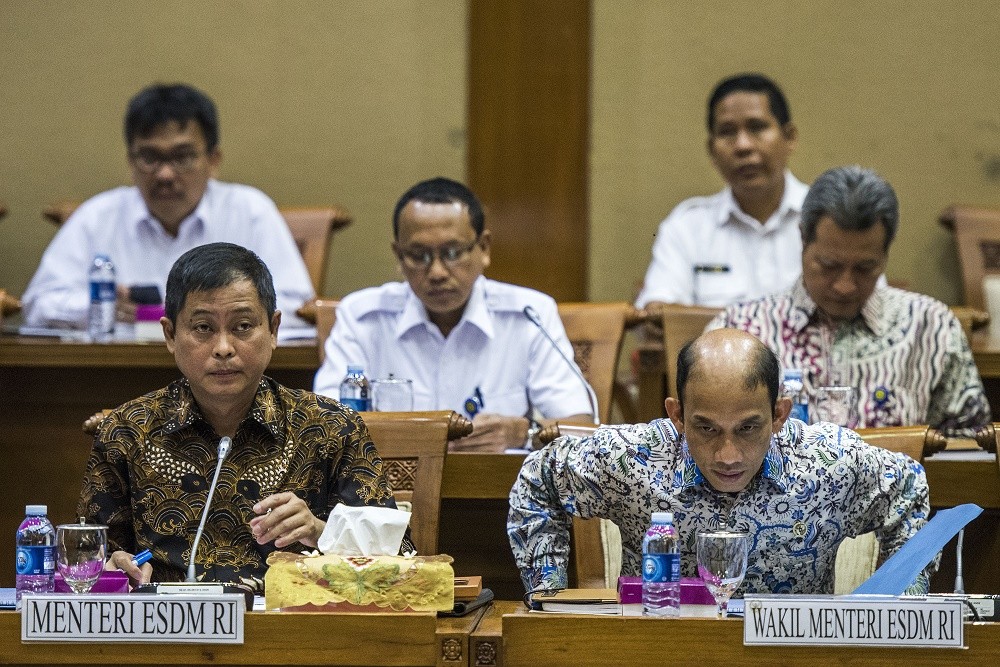Popular Reads
Top Results
Can't find what you're looking for?
View all search resultsPopular Reads
Top Results
Can't find what you're looking for?
View all search resultsMineral exports hang in balance with planned revision
A revision to a government regulation that may relax a ban on the export of semi-processed minerals remains up in the air, as the government has yet to sign the revision a mere 24 hours before the prescribed deadline.
Change text size
Gift Premium Articles
to Anyone
A revision to a government regulation that may relax a ban on the export of semi-processed minerals remains up in the air, as the government has yet to sign the revision a mere 24 hours before the prescribed deadline.
The government has been working hard on a fourth revision to Government Regulation No. 23/2010 on the management of mineral and coal businesses, which is expected to postpone a ban on semi-processed mineral exports and provide different options for divestments of shares in foreign-owned mining companies.
However, the government had yet to issue the revision by Wednesday evening despite the fact that the ban’s implementation was set to begin the next day.
Even so, Energy and Mineral Resources Minister Ignasius Jonan claimed that if the revision was not issued by Thursday, then companies would have to temporarily halt any concentrate exports.
“If there aren’t any new regulations then they must stop [exports] tomorrow. This is clear,” he said, declining to disclose whether the export ban would be immediately lifted once the revision was issued.
(Read also: Govt may lift mineral export ban)
The 2009 Mining Law prohibits the export of raw mineral products and requires mineral ore miners to complete their smelter developments by 2014, the time when the export ban should have been fully enforced.
The measure was issued to develop the downstream sector and to avoid the further importation of Indonesian-produced natural resources processed overseas.
However, because none of the proposed smelters were completed by the original deadline, former president Susilo Bambang Yudhoyono’s administration issued Government Regulation No. 1/2014 as an amendment to a 2010 government regulation in order to extend the deadline to Jan. 11, 2017.
 Mineral products exported by Indonesia.(JP/File)
Mineral products exported by Indonesia.(JP/File)
Although no official details have been revealed about the planned revision, Jonan disclosed that it would cover an extension on mineral concentrate exports in exchange for a commitment to build processing smelters as well as the obligation to convert contracts of work into special mining licenses (IUPKs).
Furthermore, it will also maximize the government’s efforts to push for- eign miners to divest 51 percent of their shares to the Indonesian State.
The latest revision draft Government Regulation No. 23/2010 obtained by The Jakarta Post shows only the export of copper concentrates will be allowed, despite the 2009 Mining Law prohibiting such exports.
Companies operating under contracts of work must also convert into IUPKs before they are allowed to export. Furthermore, the latest draft also stipulates that a new list of exports will be determined through a ministerial regulation, which is also similar to the prevailing regulation.
Any postponement in issuing the revision could affect the country’s efforts to boost state revenues. In 2015, out of nine raw minerals that should have been totally banned from export, Indonesia only banned four of them, namely manganese, chromium, nickel and aluminium.
While the Energy and Mineral Resources Ministry’s latest data shows that non-tax revenues from the mineral and coal sector reached Rp 24.29 trillion (US$1.82 billion) by mid-December from the 2016 target of Rp 30.1 trillion, the government is hoping to increase the figure to Rp 45.2 trillion this year.
Even so, the potential relaxation of a total ban on mineral exports has received mixed views from industry players.
The Bauxite and Iron Ore Companies Association (APB3I) approves of the government’s potential move to allow a limited number of companies to continue exporting semiprocessed minerals so long as there are real commitments from the companies to develop smelters.
“The government should at least give a chance to players in the mineral commodities sector to build smelters by allowing exports for a limited amount of time,” APB3I chairman Erry Sofyan said in a press release made available to the Post.
Erry explained that the export ban had been disadvantageous to the country’s gross regional domestic product (GRDP) in areas that are rich in bauxite. He cited West Kalimantan, whose GRDP decreased to 5.02 percent in 2014 from 6.04 percent the previous year, as an example.
Meanwhile, the Processing and Smelting Companies Association (AP3I) has vehemently put its foot down against a possible relaxation of the export ban.
Chairman Jonatan Handojo said extending the relaxation would create uncertainty among business players, who would then be reluctant to take part in the government’s mission to develop the downstream sector.
However, he agreed that the government regulation needed to be revised in order to “ensure legal certainty for the processing and purification of minerals”.










